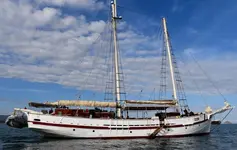Hola Amigo
There is a newspaper story in the Ballarat Star (Vic. : 1865 - 1924), Friday 24 January 1902, page 4
That gives the following story.
SOME OF CAPTAIN KIDD’S BOOTY.
NEW LONDON. Conn., Nov. 9.
The recent death of John R. Bolles, author and historian, and known as “the father of Connecticut's navy yard," has brought to light a Captain Kidd story.
which tells of the finding of ?25.000 dol. of the pirate's buried treasure. The find was in I83O. Mr Belles never spoke off; until his latter years. Mr Bolles was born 94 years ago. Or his maternal side he descended from Join. Rogers, from whom the Connecticut Quakers received the name of Rogerenes.
Rogers settled close to the Bolleses.Now called at present Harrison's Landing, on the New London northern division of the Central Vermont Railroad. Both farms were celebrated at the time they were laid out, 1668, as coming to a point at a beautiful cold, pebbly spring, which has always been famous among whale men and others making long voyages for its purity and sweetness-This spring is now at- 'the head of a small cove which opens into the Thames River.
It is known as Sweet Water Spring. For a time Kidd's vessel lay off the spring. Kidd was described by the last of the Bolleses as a tall, black bearded man. Wearing scarlet cape, a slouch hat with a drooping purple plume, a long sword, a brace of gold mounted pistols, and his clothing richly trimmed with gold braid. Most of the pirate's time here was spent with a family named Mills, who were among the Quakers near the spring.
Several daughters in this family did sewing for the pirate and his crew, receiving in pay laces, silks, and trinkets. _ Some of this lace is still in the possession of descendants of the Rogerenes. Seventy-five years after Kidd was hanged one of the Rogers family, while walking down to the Sweet Water Spring stepped upon some frost-loosened earth on the bank, and his right leg went into the ground above the knee.
His foot struck some sharp substance, and he cleared away the earth enough to find crumbling planks that covered two trving-out pots, such as are used to try out nil in whale ships. Both were full of coins, both gold and silver Captain Kidd’s memory flashed through his brain.
Covering up the pots he determined to let the secret die with him. This resolution he broke by telling his wife of it when he was dying, taking care to make her promise never to divulge the secret unless someone in the family should become hampered by the want of money?
Mrs Rogers revealed the story before her death to descendants of the Mills family, who had bought the place. About 60 years after this, in 1839, when John R. Bolles was a young man, two of the Mills boys made use of the secret, their fortunes being in a bad way.
They used a sounding rod and sounded all about the spring, according to the Bolles story, until they struck the money. It is said that the money laid the foundation of fortunes for the Bolles, who subsequently lived in New York City and in the West.
This newspaper story came out in 1902 was there any truth to this story or just a family legend?
Kanacki






